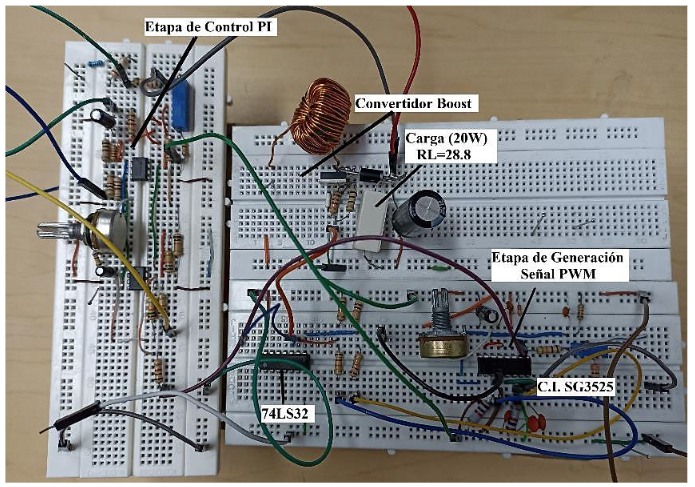Design and implementation of a regulated boost converter, employing a PI control strategy
DOI:
https://doi.org/10.22517/23447214.25452Keywords:
DC/DC Boost converter, duty cycle, PI control, gain, C.I. SG3525Abstract
The present work exposes the design and implementation of a non-isolated DC/DC Boost converter operating with a nominal load of 20 W, constant output voltage of 24V and variable input voltage of 12 ∓25%V. The development was carried out in the Power Electronics laboratories, of the Electromechanical Engineering program of the Universidad Francisco de Paula Santander following the proposed solution methodology, and whose results allowed to conclude that, the implemented PI control system improves the dynamic response of the converter in closed loop compared to that obtained in open loop, presenting steady state errors that ranged between 1.66% (for a Vin of 9V) and 3.33% (for a Vin of 12V and 15V) in relation to the desired 24V, managing to stabilize the output voltage for the different voltage changes generated at the input, thus demonstrating the importance of control systems and simulation tools in the design and analysis of circuits in power electronics.
Downloads
References
C. A. Díaz Rodríguez, “Diseño de un regulador de carga de 150W con tecnología MPPT para un panel fotovoltaico acoplado a una micro-red DC aislada”, Tesis de Grado, Universidad Francisco de Paula Santander, Cúcuta, 2023.
W. J. Peña La Torre y J. E. Nevado Talledo, “Desarrollo de un sistema de control que hace el seguimiento del máximo punto de potencia en paneles solares aplicado a sistemas de generación fotovoltaica para entornos rurales”, Tesis de Grado, Universidad Peruana de Ciencias Aplicadas (UPC), Lima, 2019. [En línea]. Disponible en: https://repositorioacademico.upc.edu.pe/handle/10757/626089
H. Acevedo Meza, J. L. Mendoza García, y S. B. Sepúlveda Mora, “Estrategias de control MPPT aplicadas en un convertidor DC/DC tipo Boost para sistemas fotovoltaicos”, Revista Colombiana de Tecnologías de Avanzada, vol. 2, núm. 30, pp. 1–7, 2017, doi: 10.24054/16927257.v30.n30.2017.2751
D. W. Hart, Electrónica de Potencia. Madrid: Pearson Educación S.A., 2001.
C. A. Martínez Barbosa, “Diseño e implementación de un sistema MPPT y regulación de voltaje mediante CRAP del panel solar SUNMODULE SW50”, Tesis de Grado, Universidad Tecnológica de la Mixteca, Huajuapan de León, 2016. Consultado: el 14 de marzo de 2023. [En línea]. Disponible en: http://jupiter.utm.mx/~tesis_dig/13081.pdf
M. H. Rashid, Electrónica de Potencia. Circuitos, Dispositivos y Aplicaciones, 3ra ed. México: Pearson Educación, 2004.
P. T. Krein, Elements of power electronics. New York: Oxford University Press, Inc., 1998.
N. Mohan, T. M. Undeland, y W. P. Robbins, Electrónica de potencia: Convertidores, Aplicaciones y Diseño., 3ra ed. México: McGraw Hill, 2009.
G. E. Gallego Rodríguez, Elementos de electrónica de potencia. Bucaramanga: División de publicaciones de la UIS, 2017. doi: 10.1/JQUERY.MIN.JS.
J. Vargas Castillo, “La teoría de Floquet en el modelado y análisis de convertidores de potencia”, Tesis de Maestría, Universidad Michoacana de San Nicolás de Hidalgo, Morelia, 2022. Consultado: el 4 de abril de 2023. [En línea]. Disponible en: http://bibliotecavirtual.dgb.umich.mx:8083/xmlui/handle/DGB_UMICH/8478
C. A. Silva Oviedo, “Diseño e implementación de un convertidor DC/DC elevador de voltaje a partir de una batería de 12 voltios”, Tesis de Grado, Universidad Santo Tomas, Bogotá D.C., 2019. Consultado: el 4 de abril de 2023. [En línea]. Disponible en: https://repository.usta.edu.co/bitstream/handle/11634/34728/2020carlossilva.pdf?sequence=1&isAllowed=y
G. F. Guarderas Burbano, “Modelizado en caja negra de convertidores electrónicos de potencia para aplicaciones en microrredes de corriente alterna”, Tesis Doctoral, Universidad Politécnica de Madrid, 2019. doi: https://doi.org/10.20868/UPM.thesis.57769
F. F. Valderrama, H. M. C, y H. M. Vega, “Análisis, simulación y control de un convertidor de potencia DC- DC tipo boost”, Ingenium Revista de la facultad de ingeniería, vol. 12, núm. 24, pp. 44–55, 2011, doi: 10.21500/01247492.1295
W. J. Beltrán Duarte, C. A. Peñaloza Luna, G. E. Gallego Rodríguez, y J. J. Ramírez Mateus, “Diseño y simulación de un módulo inversor fotovoltaico didáctico para el laboratorio de Electrónica de Potencia de la Universidad Francisco de Paula Santander”, Tesis de Grado, Universidad Francisco de Paula Santander, Cúcuta, 2020.
C. I. Rueda Panchano, K. Y. Simisterra Quiñonez, G. I. Rueda Salazar, L. F. Palacios García, y N. F. Mina González, “Modelación de un convertidor DC-DC reductor en modo de conducción continua”, Sapienza: International Journal of Interdisciplinary Studies, vol. 3, núm. 4, pp. 250–260, ago. 2022, doi: 10.51798/SIJIS.V3I4.466

Downloads
-
Vistas(Views): 752
- PDF (Español (España)) Descargas(Downloads): 326
- HTML (Español (España)) Descargas(Downloads): 19
Published
How to Cite
Issue
Section
License
Copyright (c) 2024 Scientia et Technica

This work is licensed under a Creative Commons Attribution-NonCommercial-ShareAlike 4.0 International License.
Copyrights
The journal is free open access. The papers are published under the Creative Commons Attribution / Attribution-NonCommercial-NoDerivatives 4.0 International - CC BY-NC-ND 4.0 license. For this reason, the author or authors of a manuscript accepted for publication will yield all the economic rights to the Universidad Tecnológica of Pereira free of charge, taking into account the following:
In the event that the submitted manuscript is accepted for publication, the authors must grant permission to the journal, in unlimited time, to reproduce, to edit, distribute, exhibit and publish anywhere, either by means printed, electronic, databases, repositories, optical discs, Internet or any other required medium. In all cases, the journal preserves the obligation to respect, the moral rights of the authors, contained in article 30 of Law 23 of 1982 of the Government Colombian.
The transferors using ASSIGNMENT OF PATRIMONIAL RIGHTS letter declare that all the material that is part of the article is entirely free of copyright. Therefore, the authors are responsible for any litigation or related claim to intellectual property rights. They exonerate of all responsibility to the Universidad Tecnológica of Pereira (publishing entity) and the Scientia et Technica journal. Likewise, the authors accept that the work presented will be distributed in free open access, safeguarding copyright under the Creative Commons Attribution / Recognition-NonCommercial-NoDerivatives 4.0 International - https://creativecommons.org/licenses/by-nc-nd/4.0/deed.es license.


